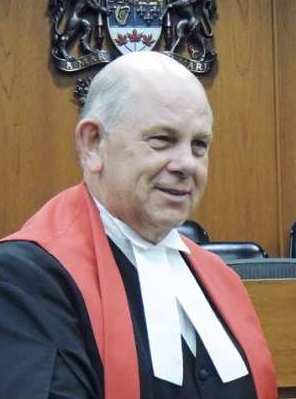Like this article? rabble is reader-supported journalism. Chip in to keep stories like these coming.
Anti-NDP petitioners tacitly supported by the Wildrose Party who imagine they can magically and instantly overthrow the government of Premier Rachel Notley in a “#kudatah” on the day the Legislature resumes sitting appear to have been influenced by the beliefs of extremist fringe groups going by such names as Detaxers, Freemen and Sovereign Citizens.
It is impossible to know for certain because the petition organizers have so far refused to divulge their strategy in detail.
If this is the case, though, it should be cause for grave concern by the Official Opposition, because it would mean they have thrown in their lot with people associated with a movement that according to the Wikipedia “a survey of law-enforcement officials and agencies across the United States concluded … was the single greatest threat to their communities.”
The possibility this is exactly what is influencing this group seems strong based on hints the petitioners have dropped on social media about their strategy. As a commenter wrote on this blog’s most recent post, the reference to a commissioner for oaths is the tip-off.
As readers of the most recent post will recall, the petition’s advocates seem to believe that if they can get Albertans to sign a petition demanding a binding plebiscite on a government bill, and if the government says no to the plebiscite, and if a commissioner of oaths agrees the premier therefore isn’t doing her job, then the Lieutenant-Governor must remove the government.
Needless to say, this is not a likely outcome.
A 2012 decision of the Alberta Court of Queen’s Bench written by Associate Chief Justice John D. Rooke defines in great detail a “category of vexatious litigant,” members of which “employ a collection of techniques and arguments promoted and sold by ‘gurus’ … to disrupt court operations and to attempt to frustrate the legal rights of governments, corporations, and individuals.”
Having sat in judgment over a 2012 divorce case involving such a litigant, Justice Rooke defined this category of litigant as “Organized Pseudolegal Commercial Argument litigants,” or OPCA litigants, and described how their “strategies as brought before this Court have proven disruptive, inflict unnecessary expenses on other parties, and are ultimately harmful to the persons who appear in court and attempt to invoke these vexatious strategies.”
“Because of the nonsense they argue, OPCA litigants are invariably unsuccessful and their positions dismissed, typically without written reasons,” Justice Rooke wrote in his decision in Meads v. Meads. “… These are little more than scams that abuse legal processes.” (Emphasis added.)
In the decision, Justice Rooke’s references relevant to this political story are to notaries, who in Alberta perform functions similar to those of commissioners for oaths. But then, as the judge pointed out, believers in such legal fantasies tend to work from templates provided by “gurus,” who are often more familiar with other jurisdictions.
Justice Rooke wrote of this group of litigants: “OPCA litigants sometimes appear to imbue notaries with extraordinary court-like authority.” In fact, he said, “a notary cannot give special status to an OPCA document.”
“Another curious belief that purports to limit court jurisdiction is that notaries, as a kind of common law official, in some manner possess judicial or judge-like authority that displaces the authority of Canadian courts. …
“Naturally, this claim is rubbish, and the litigants offered no foundation for this concept.”
Accordingly, Justice Rooke warned Alberta notaries, the ranks of which include lawyers: One of their duties “is to not participate in or facilitate OPCA schemes. … I was very disturbed and profoundly disappointed to see the number of occasions where an OPCA document was notarized by a practicing lawyer. … This kind of action is inappropriate for an officer of the court. It assists implementation of vexatious litigation strategies.”
Additional passages from Justice Rooke’s ruling will resonate with Albertans who have been following the #kudatah political story:
“OPCA litigants have an alarming predisposition to a belief that they can ‘take justice into their own hands’ and act against the judiciary,” he wrote in one place. “It is therefore appropriate that a court may adopt specific in‑court and security procedures in response to persons who are suspected OPCA litigants. Additional in-court security is generally warranted.”
In another place, he wrote that strong action against OPCA litigants by the courts lead some of them to believe that “this would alienate the populace from the Queen and trigger a coup d’état.”
Meads v. Meads isn’t exactly light reading, but it is easy to understand and highly illuminating considering the kind of political discourse we Albertans are seeing with increasing frequency on social media and even in mainstream media in Alberta.
The concerns set out by Justice Rooke help explain why the U.S. Federal Bureau of Investigation classifies some members of such groups as “domestic terrorists.”
The message here is that legitimate right-wing protest groups, social media sites, mainstream media and political parties all need to pay attention to whom they are climbing into bed with, metaphorically speaking.
Since Wildrose MLAs have been directing constituents to the petitions in question, it would seem they are not practicing “safe politics” just at this moment, at least until the petition organizers have satisfactorily explained their legal strategy. We can only hope the Wildrose caucus will attend to that, and take appropriate prophylactic measures.
The spring sitting of Alberta’s 29th Legislature is scheduled to open with a Throne Speech written by the NDP government on March 8.
This post also appears on David Climenhaga’s blog, AlbertaPolitics.ca.
Like this article? rabble is reader-supported journalism. Chip in to keep stories like these coming.




